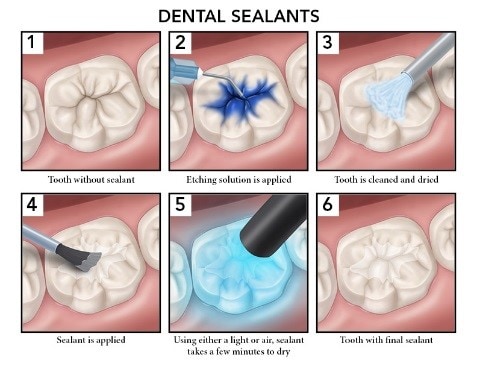Dental sealants dangers this topic people are often interested in because there are important reasons for this. However the American Dental Association ADA reports there is no evidence that exposure to BPA in a dental sealant has any adverse health effects.
 Dental Sealant Faqs School Based Dental Sealant Programs Division Of Oral Health Cdc
Dental Sealant Faqs School Based Dental Sealant Programs Division Of Oral Health Cdc
The most common cause of external resorption is an injury to the teeth and mouth that leads to swelling and loss of tissue and bone surrounding the affected teeth.

Tooth sealant dangers. However three studies including nearly 2000 participants showed that sealants reduced the risk of cavities by 73 compared to those who used fluoride varnishes alone. My sons rash went away within a week after the sealants were removed. The tooth must be thoroughly cleaned of debris and bacteria.
Dental sealants arenot permanent and ordinarily last approximately five years. According to WebMD Dental sealant is a thin plastic coating painted on the chewing surfaces of teeth usually the back teeth to prevent tooth decay. Yes while less common dental sealants are sometimes placed in adults at risk for caries on deep grooves and fissures that do not already have fillings or dental sealants.
Can dental sealants be place on the teeth of adults. Thats because plastic dental sealants have a small amount of BPA or bisphenol A. The clear plastic film is hardened with a curing light.
In most cases dental sealants are placed on children. The only potential side effect of sealant on your teeth is a possible allergy to it. Not applying sealants to partially erupted teeth.
Bisphenol-A BPA or its chemical cousin bisphenol-A dimethacrylate BPA-DMA. Some sealants contain the highest levels of volatile BPA which studies suggest may be an estrogenic hormone-altering agent. Sealants which are usually applied to back teeth as barriers against decay-causing bacteria may leach bisphenol-A BPA an endocrine disruptor.
Hermetically sealing a tooth may sound odd if not unnecessary but what has concerned researchers through the years is that dental sealants can contain the same chemicals that caused controversy when present in plastic baby bottles. Our dentist only seals teeth in the deep grooves as opposed to coating the entire tooth so it was much like removing a filling. Then the dentist paints the sealant on the tooth.
1416 Griffin et al 17 found that the successful application of sealants decreased caries risk by more than 70 for up to 5 years after placement. After cleansing the tooth an etchant solution is applied so that the sealant will adhere to the tooth enamel. Some people are concerned about rumors of dental sealant dangers.
In order to properly apply them a dry clean environment is needed so that the sealant can efficiently adhere. Obviously a lot of dentists confirm that this is a pretty difficult operation since it can be challenging to keep a. Typically sealants last five to 10 years but they should be checked at every dental appointment to make sure theyre still in place.
Moreover many use little-studied compounds such as triethylene glycol dimethacrylate TEGDMA and urethane dimethacrylate UDMA that may or may not pose risks of their own. It hardens in about a minute. However and itâ s a big however in this case all dental sealants contain BPA derivatives that convert to BPA by reacting with enzymes in our saliva2.
Despite these concerns and overwhelming evidence pointing to its dangers the American Dental Association remains strongly in favor. The good news is reactions related to dental sealants are infrequent. Fluoride varnish and treatments are generally used for all teeth while sealants are usually used on the back teeth.
However the ADA has determined that dental sealants are safe and there is no danger of exposure to BPA. But are they safe. Endocrine disruptors have been linked to declining sperm counts and increased cancer rates in humans.
They act as physical barriers to the tooth surface and if not placed correctly can lead to an abolition of the enamel. The sealant quickly bonds into the depressions and grooves of the teeth forming a protective shield over the enamel of each tooth According to the ADA sealants reduce the risk of decay by up to 50. After the target tooth is cleaned a gel is applied to the chewing surface and then washed and dried a few seconds later.
Their use reduces the risk of food and plaque accumulating in vulnerable pits and fissures and generates a barrier of protection from decay-causing acids. Other dental sealants promoted as calcium hydroxide sealants are in fact only about 50 calcium hydroxide. In order to solve this problem he always turned to the dentist.
There are several factors that may lead to resorption of teeth. Almost every person has experienced toothache in his life. Tooth resorption causes.
Therefore the services of a dentist are a necessary and even inevitable thing in our life. There was no damage to the teeth or enamel. Dental Sealants are Long-Lasting.